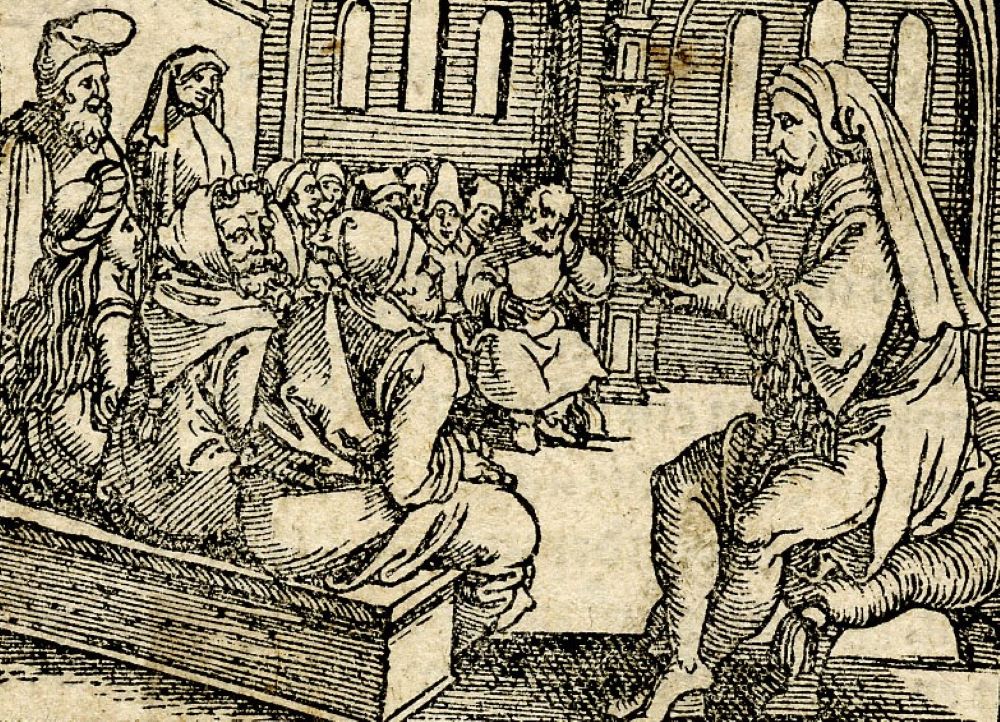
The Old Testament prophet Amos, right, is depicted in a 1533 woodcut print. (Wikimedia Commons/British Museum/Christian Egenolph)
Amos said, "Hear this, you who trample on the needy!" Eight hundred years later, Jesus wove a puzzle/parable using economics to illustrate the message. Paul explains that when the power of those trampling on the needy makes justice seem impossible, we must turn to prayer.
Amos said, "Hear this, you who trample on the needy!" Eight hundred years later, Jesus wove a puzzle/parable using economics to illustrate the message. Paul explains that when the power of those trampling on the needy makes justice seem impossible, we must turn to prayer.
Today's Gospel tells a story that seems to be about a steward whose master was impressed by his clever manipulations. Is Jesus' point that when about to lose a job, you should intensify your malpractice to cushion a nest for the day when you're out of work? That's what it seems like. Jesus says, "The children of this world are more prudent … than the children of the light."
What? The "worldly" are more prudent? According to the Catechism of the Catholic Church (1806), "Prudence is the virtue that disposes practical reason to discern our true good … and to choose the right means of achieving it." So, the steward who worked fast behind his employer's back was discerning good and acting for it? How?
Biblical scholar N.T. Wright offers an interesting perspective on this story. He points out that Scripture prohibited the lending of money for interest. Therefore, what some clever folks did was lend in kind: olive oil, wheat, etc. on which they could collect interest. Wright suggests that the book-cooking steward went to the debtors and bargained for exactly what they had borrowed, erasing the exorbitant interest the master was charging.
In the end, the steward had made a lot of friends on whom he could count when the time came. The duped master had little recourse. He had found a way around the law; bringing the servant to "justice" would have exposed him as a scoundrel. Besides, he wasn't really losing anything — he got back what he had lent out — which was the intent of the law. Not only that, but, like it or not, the steward's action brought the master back to the realm of justice. He was no longer trampling the needy or writing them off like a pair of sandals. Folks who understood Jesus' point went home laughing.
On the way home, they may have mulled over the message: "That's a shrewd way to deal with our own, with people who say they believe what we do and who will feel shame when caught. What about the ones who have all the power and oppress us?"
Paul gives Timothy some very practical advice about dealing with oppressors. First, he says, pray for "all in authority that we may live a quiet and tranquil life." In other words, "pray for your enemies and don't poke the bear." But there's more. He adds that God wants everyone to be saved through Christ who excluded no one. Paul ends by counseling all to pray without anger or argument — an attitude that requires hard and generous prayer when it comes to people who make life harder for others.
The combination of these two readings with Amos' warning to those who destroy the poor, takes us into the ambiguous territory if we want to convert a parable into practice. Sometimes the kind of question a 5-year-old could answer helps us make a good judgment: "In Jesus' parable, who did the most good for others?" Obviously, the steward, seemingly the most dishonest of them all. What does that tell us?
Advertisement
Jesus was a master at undermining systems. Instead of fixating on clear rules and regulations, he saw beneficiaries and underdogs created by well-controlled social structures. He saw that debtors were caught in a vicious circle of increasing interests, that poor widows had very little chance to survive in a dignified manner, that the blind and lame were blamed for disabilities over which they had no control. He was not pleased with what he saw and taught that it grieved God as well. What to do?
Jesus says, "Be shrewd as serpents and simple as doves." Doesn't that describe the steward? He harmed no one and his activity helped the poor, invited the master beyond a life of usury and saved his own skin at the same time. Jesus seems to say that some laws don't merit obedience — at least not in God's eyes.
Today we're asked what we want to serve or obey. Is it law? Is it our own good? Is it the so-oft forgotten common good?
What are we to do? First, pray. Pray for the intention of doing good for all. Review who we include in the "all" we consider. Ask for a generous heart. Pray for a clear vision of what is really happening. Pray for inspiration and the creative courage needed to carry out the urgings of a critical conscience. And then, let the Spirit and your critical conscience be your guide.








